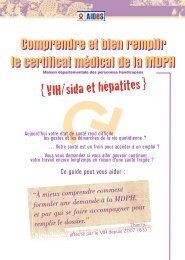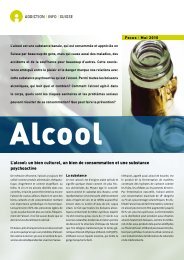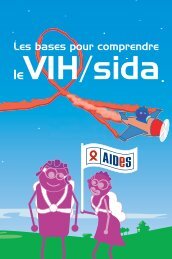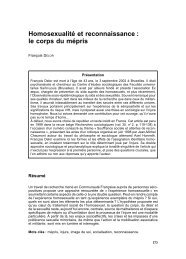Care and support for people living with HIV/AIDS
Care and support for people living with HIV/AIDS
Care and support for people living with HIV/AIDS
You also want an ePaper? Increase the reach of your titles
YUMPU automatically turns print PDFs into web optimized ePapers that Google loves.
Report on the global <strong>HIV</strong>/<strong>AIDS</strong> epidemic – June 2000wide-ranging measures needed to bring this about are public statements by community<strong>and</strong> religious leaders urging solidarity <strong>with</strong> those affected, <strong>and</strong> legal <strong>and</strong> othermechanisms <strong>for</strong> protecting <strong>HIV</strong>-affected individuals <strong>and</strong> survivors from discrimination,loss of inheritance <strong>and</strong> property-grabbing.Psychological <strong>and</strong> social <strong>support</strong> can help reduce stigma <strong>and</strong> other negative consequencesof being <strong>HIV</strong>-positive <strong>and</strong> in this way make <strong>people</strong> less reluctant to seek<strong>HIV</strong> counselling <strong>and</strong> testing. In turn, the staff of counselling <strong>and</strong> testing facilities cancontribute to psychological <strong>support</strong>, <strong>for</strong> example, by assisting individuals to sharethe news of their test result <strong>with</strong> their spouse or a trusted relative. Their contributioncould be even greater if voluntary counselling <strong>and</strong> testing services were more widelyaccessible <strong>and</strong> more welcoming to certain categories of clients. In particular, theseservices need to be better geared to attracting young <strong>people</strong>, couples <strong>and</strong> men.Another challenge is time. In busy community health settings, where staff have toomuch to do, it is important to find ethically acceptable ways of reducing the timerequired <strong>for</strong> counselling.Associations of <strong>people</strong> <strong>living</strong> <strong>with</strong> <strong>HIV</strong> are a good example of community mechanismsthat provide both psychological <strong>and</strong> social <strong>support</strong>. Formed to counter thesocial isolation often experienced by <strong>HIV</strong>-positive <strong>people</strong> <strong>and</strong> to allow them toshare <strong>and</strong> discuss their experiences <strong>and</strong> problems openly <strong>and</strong> safely, these mutual<strong>support</strong> mechanisms provide peer <strong>support</strong> <strong>and</strong> help members cope <strong>with</strong> discrimination<strong>and</strong> stigma. One such group, at an antenatal clinic in South Africa, wasdescribed by the women members as the only place where they could relax <strong>and</strong> bethemselves.However, <strong>support</strong> groups are generally unable to meet one of the most importantchallenges facing <strong>people</strong> in developing countries: lack of income. Most <strong>people</strong> <strong>with</strong><strong>HIV</strong> or <strong>AIDS</strong> are or become unemployed, <strong>and</strong> the stark reality is that unless they canrely on broader <strong>support</strong> from government <strong>and</strong> society there is little a communitygroup can do to alleviate this impact.Alleviating economic impactMany <strong>support</strong> organizations have discovered the pitfalls of trying to alleviate theeconomic hardship of their members. The <strong>AIDS</strong> Support Organization (TASO) ofUg<strong>and</strong>a, which runs <strong>support</strong> groups <strong>for</strong> <strong>people</strong> <strong>living</strong> <strong>with</strong> <strong>HIV</strong>, asked members ofone group how their home <strong>support</strong> could be improved. Three-fifths said theyneeded capital to start an income-generating activity <strong>and</strong> close to half asked <strong>for</strong>increased assistance of the kind already being provided, such as staple foodstuffs<strong>and</strong> cash <strong>for</strong> school fees, uni<strong>for</strong>ms <strong>and</strong> books to enable their children to go toschool.In one scheme, selected TASO centres received funds to be given as revolvingloans <strong>for</strong> income-generating projects. While 75% of the projects were laterassessed as having been successful enough <strong>for</strong> the clients to repay their loans,94











